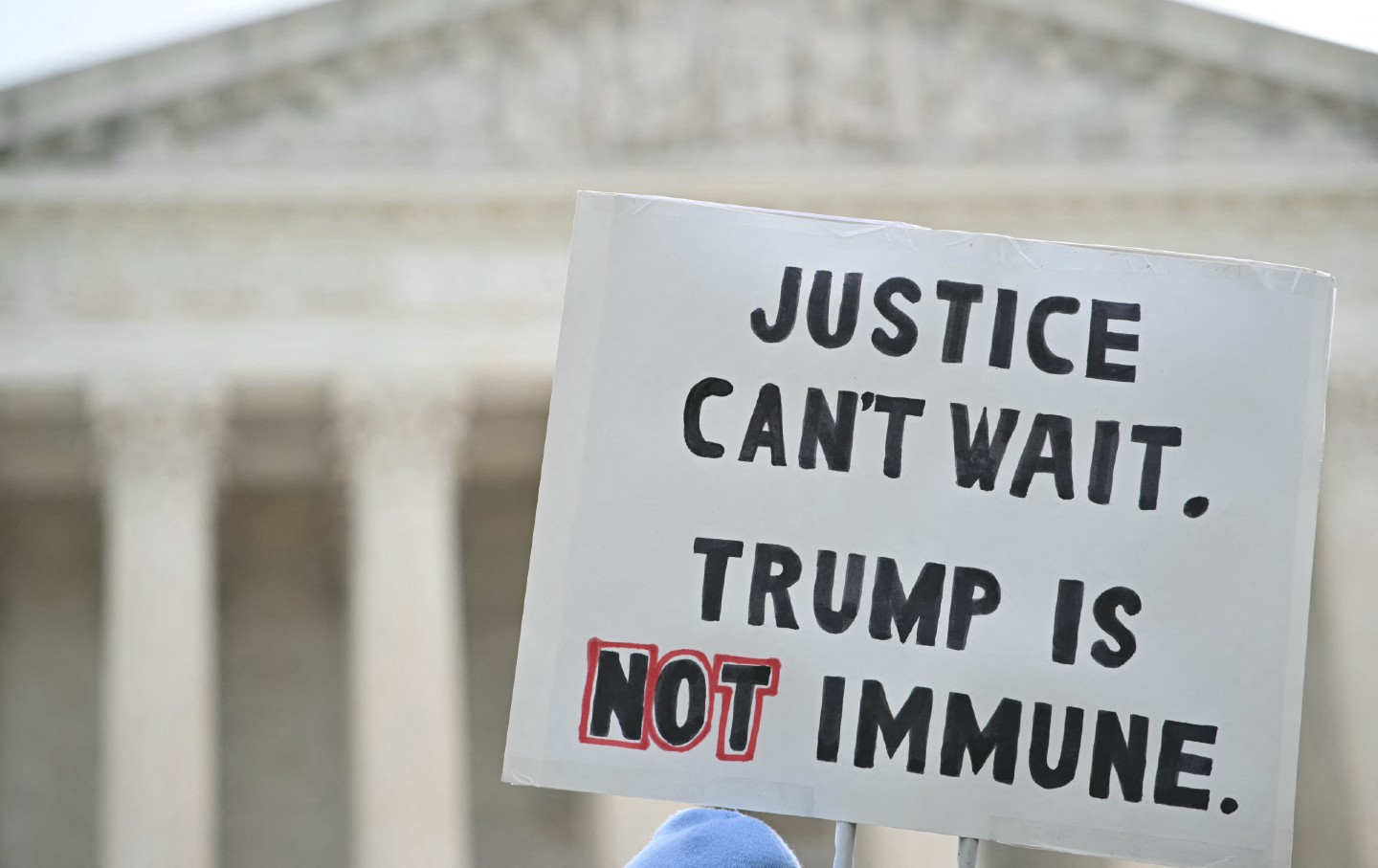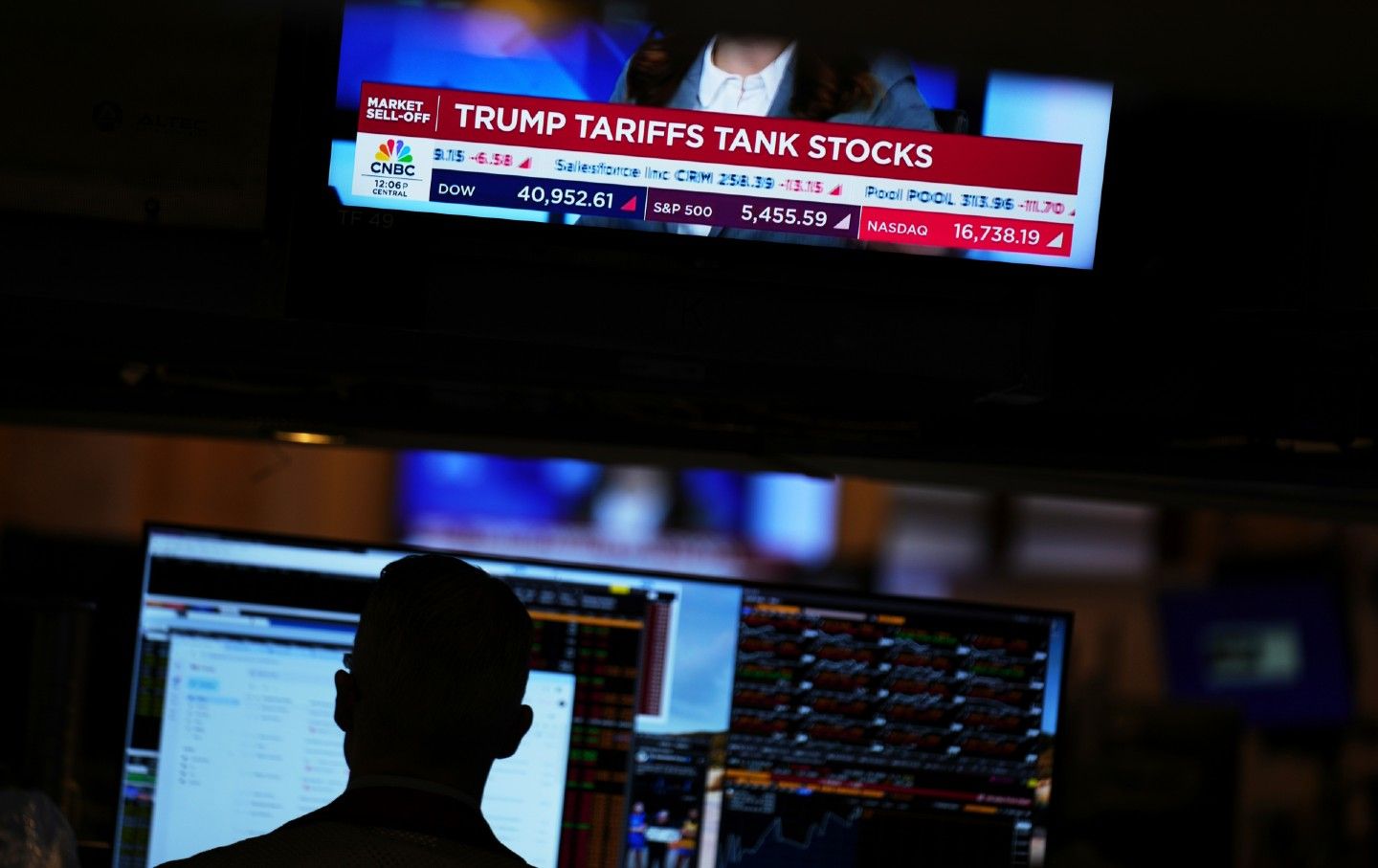The Supreme Court’s 5 Male Justices Are Fully in the Tank for Trump
During the former president’s immunity hearing, Roberts & Co. made clear that they’re going to do everything they can to delay Trump’s criminal reckoning.

Donald Trump believes that he has the Supreme Court in his back pocket. He is right. The court heard oral arguments on Thursday in Trump v. United States, the case about whether Trump is immune from prosecution over his attempt to obstruct Congress and reverse the results of the election he clearly lost. Trump is counting on delaying the trial about his crimes committed in the previous election until he gets to the next one, which he hopes to win so he can then dismiss the charges against him. The Supreme Court has done everything in its power to help Trump accomplish his goals, and that pattern continued on Thursday.
At this point, people who expect anything less than the maximum partisan thuggery possible from the Republicans justices are not paying attention—or worse, they’re actively lying to themselves and the American people about what the Roberts court has become. The question has long since ceased being “whether” the court will help Trump; the question is only “how” it will go about doing it.
Heading into oral arguments, the justices-for-Trump crowd had three ways to stand by their man: They could grant Trump absolute immunity; they could reject immunity but release their ruling as late as possible; or they could send the case back down to the DC Circuit court for an additional ruling (lawyers call this a “remand”) that would trigger another appeal and another opportunity for delay.
The first option is kind of a nonstarter. Unlike, say, the Republican judges on the US Court of Appeals for the Fifth Circuit, the Republicans on the Supreme Court are generally careful to make sure that their pro-Trump rulings cannot be turned against them later and used by a Democratic president. Giving Trump blanket, absolute immunity could be used by people like the current president, Joe Biden, to do whatever he wanted. Granted, Biden would not use the newfound power to steal an election as Trump did—Democrats are eager to follow rules that don’t apply to the other side—and the Supreme Court knows that. But still, granting future presidents total immunity from criminal prosecution sets a precedent that even Republicans can see is dangerous.
The second option of just delaying the decision rejecting Trump’s argument has always been in play. But that option might not get the Supreme Court and Trump all the way to the next election. There is a timeline, albeit an unlikely one, where special counsel Jack Smith could still get through a trial before November, so long as the court rules against Trump by the end of the term.
That brings us to the third option: Remanding the case back to the DC Circuit. This is the option that causes maximum delay of Trump’s reckoning, allowing him to avoid it entirely if he wins the next election, while still preserving the court’s ability to say that blanket immunity is unconstitutional later down the line, should Trump lose. Remand is therefore the best possible option for the Republican justices if they want to see a Republican president elected in November—and at oral arguments, most of them signaled that’s exactly what they’re going to do.
Chief Justice John Roberts led the charge for remand. According to Roberts, the president is not immune from criminal prosecution for “personal acts,” but he left open the possibility that Trump could be immune from criminal prosecution for some of his official acts. In either case, Roberts argued that the DC Circuit did not fully explain which of Trump’s allegedly criminal acts were “official,” nor the reason he should be prosecuted for any of those official acts, so the case needed to be remanded. When questioning the government’s lawyer, Michael Dreeben (a former deputy solicitor general who has been part of special counsel Jack Smith’s legal team), Roberts asked, “Why shouldn’t we either send it back to the court of appeals, or issue an opinion saying [the DC Circuit ruling] is not the law?” He continued: “The court of appeals did not get into a focused consideration of what acts we’re talking about or what documents we’re talking about…. they did not look at what courts usually look at.” Roberts’s idea is basically to make the DC Circuit redo its homework, even though it has already provided him with the correct answer.
Roberts’ approach is wrong on at least two levels. First, the crimes that Trump is charged with cannot reasonably be construed as having been “official acts,” so the lower court should not be required to explain the difference between official and personal acts. It’s not, for instance, “official” for a president to use his power to submit fake electors in an effort to obstruct the certification of the election results. The liberal justices made this point repeatedly. Justice Elena Kagan was particularly effective when questioning Trump’s lawyer, John Sauer, about whether “attempting a coup” could possibly be construed as “official.” (Sauer, reluctantly, said yes, attempting a coup could be construed as an official act and that Trump should be immune for such crimes, which only serves to highlight the utter ridiculousness of Trump’s argument.)
Roberts is also wrong when he suggests that the DC Circuit didn’t complete its homework. The DC Circuit never got to the official-versus-private-acts question, because it ruled that whatever criminal immunity Trump may have had ended when Trump ceased being president. Remember, nobody else in the country can even begin to claim that they are immune to prosecution for crimes because committing crimes is part of their job. Trump’s only being allowed to make this argument because he used to be president, but the whole concept of “immunity because you’re the president” collapses (or should collapse) the moment you leave office. Trump is no longer president, and that should simply end the discussion on whether being president made him immune for the rest of his life.
It’s the part of the argument Roberts, and his fellow Republicans, never got to, because it doesn’t help their forever-president. The entire idea that a president should be treated differently, and better than, a regular citizen after they leave office runs counter to the principles of constitutional democracy. The Republicans on the court expressed a worry that post-presidential prosecution would “chill” future presidents from… committing crimes. As if that were a bad thing. But the potential chilling of presidential crime sprees has literally always been in effect, at least it was until Trump left the White House. Every president has known, or should have known, that any crimes they commit could and would be prosecuted after they left office. As Justice Ketanji Brown Jackson pointed out, if we did live in a world where presidents were forever immune, Richard Nixon wouldn’t have needed a pardon from Gerald Ford.
Roberts’s decision to help Trump out through delay wasn’t subtle, but the rest of the male conservatives were so in the tank for Trump it sounded like they’d just come back from Mar-a-Lago. Justice Clarence Thomas suggested that other presidents had “committed coups” in the past but were not prosecuted for it, which is both not true and a terrifying glimpse into how deeply the Thomas family rejects the results of elections they disagree with. Justice Samuel Alito suggested that under the standard set by Jack Smith, Franklin Delano Roosevelt could have been prosecuted for interning Japanese Americans during World War II. (The government said Alito was wrong because the Supreme Court approved of internment and thus FDR’s actions were not criminal, but, for the record, I absolutely think that FDR and any president who sends people to concentration camps should be prosecuted for war crimes.) And Justice Neil Gorsuch compared Trump’s actions on January 6 to a “peaceful civil rights protest” that blocks congresspeople from zipping around the building.
Then there was alleged attempted rapist Brett Kavanaugh, who was deeply concerned that the prosecution of Trump was politically motivated and thought Trump should be protected from that. As many people have said, every accusation from Republicans is a confession, but Kavanaugh’s alleged concern here is truly something else. That’s because Kavanaugh first came to prominence as a prosecutor working for independent counsel Kenneth Starr. Kavanaugh’s literal job consisted of pushing a politically motivated investigation into a land deal involving Bill Clinton and then digging and digging—until he ended up in Monica Lewinsky’s closet. For Kavanugh to suggest he’s now concerned about political prosecutions is the very height of hypocrisy.
Popular
“swipe left below to view more authors”Swipe →Among the conservatives, only Amy Coney Barrett seemed skeptical of the arguments made by her male colleagues. Barrett agreed that Trump couldn’t possibly be immune for everything, as his lawyers were asking, and that there was more than enough information to decide the case.
Barrett left herself enough intellectual space to still support remand if she changes her mind after consultation with John Roberts and Jesus Christ, but even if Barrett steps back from the ledge, the other Republicans are eager to jump off, so it won’t matter. A 5-4, men vs. women ruling to remand the case back to the DC Circuit is still a 5-4 ruling to delay the Trump trial indefinitely. The case will go back down to the lower court, which will once again have to hold a hearing, and will then take its sweet time writing an opinion (it’ll probably take even more time to issue a ruling now, because the Supreme Court has essentially criticized it for not having been thorough enough). That ruling, which will still be adverse to Trump (because his core legal argument is absolute trash), will be appealed to the Supreme Court again, and the court won’t even schedule oral arguments about that appeal until after the election, much less rule on anything before November. A decision to remand the case kills the case before the election, and everybody on the Supreme Court knows it.
To add insult to injury, the court likely won’t issue its ruling to remand to DC on May 9, which is the next available Supreme Court decision day, and will instead drag this all the way out until late June or July 3, which is functionally the last day of the term. It will delay this as long as possible to make sure Jack Smith has no chance of bringing Trump to trial before the election. That is its one true goal.
Trump had the Supreme Court in the bag this entire time, and he knew it. So did you. So did nearly everybody else who has been paying attention. At this point, the only people who act like the Supreme Court is anything other than the enforcement wing for the Republican political agenda are lawyers who have to argue in front of the court and therefore must pretend they can be reasoned with, and the editorial boards of The New York Times and The Washington Post. Everybody else knows that this court is corrupt and compromised and does not work for the American people but for the Republican Party and its donors.
And so I’m left asking, yet again: What are the American people prepared to do to stop these people? What reforms are people going to demand from their elected representatives? What issues are people willing to get off the couch and vote for? What bitter compromises are people willing to make to elect representatives who will at least try to bring the Supreme Court to heel?
From where I sit, the answer to all my questions appears to be “not a thing.” There will be no reforms, no demands, and no compromises. The Supreme Court will continue to be allowed to rule in favor of the Republican Party agenda for as long as the ruling conservatives draw breath (and beyond that, assuming the court is successful in engineering future Republican electoral victories).
Trump knows this too. So do his justices on the Supreme Court. Trump and the court act with impunity because Trump and the court know that nobody will stop them. They’re not wrong. Democracy does not die in darkness. Democracy dies when people won’t fight for it.








